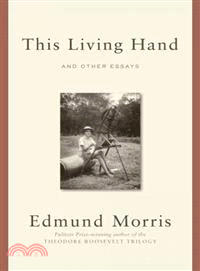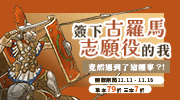This Living Hand
商品資訊
ISBN13:9780812993127
替代書名:This Living Hand
出版社:Random House Inc
作者:Edmund Morris
出版日:2012/10/23
裝訂/頁數:精裝/320頁
定價
:NT$ 1216 元優惠價
:79 折 961 元
絕版無法訂購
商品簡介
作者簡介
相關商品
商品簡介
When the multitalented biographer Edmund Morris (who writes with equal virtuosity about Theodore Roosevelt, Ronald Reagan, Beethoven, and Thomas Edison) was a schoolboy in colonial Kenya, one of his teachers told him, “You have the most precious gift of all—originality.” That quality is abundantly evident in this selection of essays. They cover forty years in the life of a maverick intellectual who can be, at whim, astonishingly provocative, self-mockingly funny, and richly anecdotal. (The title essay, a tribute to Reagan in cognitive decline, is poignant in the extreme.)
Whether Morris is analyzing images of Barack Obama or the prose style of President Clinton, or exploring the riches of the New York Public Library Dance Collection, or interviewing the novelist Nadine Gordimer, or proposing a hilarious “Diet for the Musically Obese,” a continuous cross-fertilization is going on in his mind. It mixes the cultural pollens of Africa, Britain, and the United States, and propogates hybrid flowers—some fragrant, some strange, some a shock to conventional sensibilities.
Repeatedly in This Living Hand, Morris celebrates the physicality of artistic labor, and laments the glass screen that today’s e-devices interpose between inspiration and execution. No presidential biographer has ever had so literary a “take” on his subjects: he discerns powers of poetic perception even in the obsessively scientific Edison. Nor do most writers on music have the verbal facility to articulate, as Morris does, what it is about certain sounds that soothe the savage breast. His essay on the pathology of Beethoven’s deafness breaks new ground in suggesting that tinnitus may explain some of the weird aural effects in that composer’s works. Masterly monographs on the art of biography, South Africa in the last days of apartheid, the romance of the piano, and the role of imagination in nonfiction are juxtaposed with enchanting, almost unclassifiable pieces such as “The Bumstitch: Lament for a Forgotten Fruit” (Morris suspects it may have grown in the Garden of Eden); “The Anticapitalist Conspiracy: A Warning” (an assault on The Chicago Manual of Style); “Nuages Gris: Colors in Music, Literature, and Art”; and the uproarious “Which Way Does Sir Dress?”, about ordering a suit from the most expensive tailor in London.
Uniquely illustrated with images that the author describes as indispensable to his creative process, This Living Hand is packed with biographical insights into such famous personalities as Daniel Defoe, Henry Adams, Mark Twain, Evelyn Waugh, Truman Capote, Glenn Gould, Jasper Johns, W. G. Sebald, and Winnie the Pooh—not to mention a gallery of forgotten figures whom Morris lovingly restores to “life.” Among these are the pianist Ferruccio Busoni, the poet Edwin Arlington Robinson, the novelist James Gould Cozzens, and sixteen so-called “Undistinguished Americans,” contributors to an anthology of anonymous memoirs published in 1902.
Reviewing that book for The New Yorker, Morris notes that even the most unlettered persons have, on occasion, “power to send forth surprise flashes, illuminating not only the dark around them but also more sophisticated shadows—for example, those cast by public figures who will not admit to private failings, or by philosophers too cerebral to state a plain truth.” The author of This Living Hand is not an ordinary person, but he too sends forth surprise flashes, never more dazzlingly than in his final essay, “The Ivo Pogorelich of Presidential Biography.”
Whether Morris is analyzing images of Barack Obama or the prose style of President Clinton, or exploring the riches of the New York Public Library Dance Collection, or interviewing the novelist Nadine Gordimer, or proposing a hilarious “Diet for the Musically Obese,” a continuous cross-fertilization is going on in his mind. It mixes the cultural pollens of Africa, Britain, and the United States, and propogates hybrid flowers—some fragrant, some strange, some a shock to conventional sensibilities.
Repeatedly in This Living Hand, Morris celebrates the physicality of artistic labor, and laments the glass screen that today’s e-devices interpose between inspiration and execution. No presidential biographer has ever had so literary a “take” on his subjects: he discerns powers of poetic perception even in the obsessively scientific Edison. Nor do most writers on music have the verbal facility to articulate, as Morris does, what it is about certain sounds that soothe the savage breast. His essay on the pathology of Beethoven’s deafness breaks new ground in suggesting that tinnitus may explain some of the weird aural effects in that composer’s works. Masterly monographs on the art of biography, South Africa in the last days of apartheid, the romance of the piano, and the role of imagination in nonfiction are juxtaposed with enchanting, almost unclassifiable pieces such as “The Bumstitch: Lament for a Forgotten Fruit” (Morris suspects it may have grown in the Garden of Eden); “The Anticapitalist Conspiracy: A Warning” (an assault on The Chicago Manual of Style); “Nuages Gris: Colors in Music, Literature, and Art”; and the uproarious “Which Way Does Sir Dress?”, about ordering a suit from the most expensive tailor in London.
Uniquely illustrated with images that the author describes as indispensable to his creative process, This Living Hand is packed with biographical insights into such famous personalities as Daniel Defoe, Henry Adams, Mark Twain, Evelyn Waugh, Truman Capote, Glenn Gould, Jasper Johns, W. G. Sebald, and Winnie the Pooh—not to mention a gallery of forgotten figures whom Morris lovingly restores to “life.” Among these are the pianist Ferruccio Busoni, the poet Edwin Arlington Robinson, the novelist James Gould Cozzens, and sixteen so-called “Undistinguished Americans,” contributors to an anthology of anonymous memoirs published in 1902.
Reviewing that book for The New Yorker, Morris notes that even the most unlettered persons have, on occasion, “power to send forth surprise flashes, illuminating not only the dark around them but also more sophisticated shadows—for example, those cast by public figures who will not admit to private failings, or by philosophers too cerebral to state a plain truth.” The author of This Living Hand is not an ordinary person, but he too sends forth surprise flashes, never more dazzlingly than in his final essay, “The Ivo Pogorelich of Presidential Biography.”
作者簡介
Edmund Morris was born and educated in Kenya and went to college in South Africa. He worked as an advertising copywriter in London before immigrating to the United States in 1968. His first book, The Rise of Theodore Roosevelt, won the Pulitzer Prize and the National Book Award in 1980. Its sequel, Theodore Rex, won the Los Angeles Times Award for Biography in 2002. In between these two books, Morris became President Reagan’s authorized biographer, and published the national bestseller Dutch: A Memoir of Ronald Reagan. More recently he has written Beethoven: The Universal Composer and completed his Theodore Roosevelt trilogy with Colonel Roosevelt. Edmund Morris lives in New York City and Kent, Connecticut, with his wife and fellow biographer, Sylvia Jukes Morris.
主題書展
更多
主題書展
更多書展今日66折
您曾經瀏覽過的商品
購物須知
外文書商品之書封,為出版社提供之樣本。實際出貨商品,以出版社所提供之現有版本為主。部份書籍,因出版社供應狀況特殊,匯率將依實際狀況做調整。
無庫存之商品,在您完成訂單程序之後,將以空運的方式為你下單調貨。為了縮短等待的時間,建議您將外文書與其他商品分開下單,以獲得最快的取貨速度,平均調貨時間為1~2個月。
為了保護您的權益,「三民網路書店」提供會員七日商品鑑賞期(收到商品為起始日)。
若要辦理退貨,請在商品鑑賞期內寄回,且商品必須是全新狀態與完整包裝(商品、附件、發票、隨貨贈品等)否則恕不接受退貨。
























